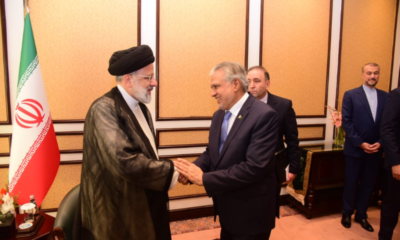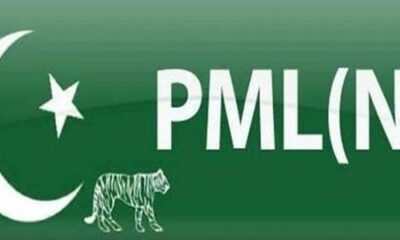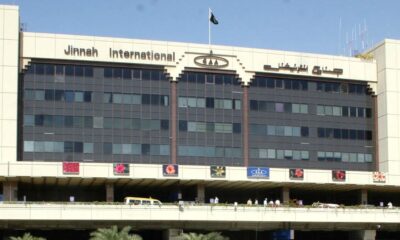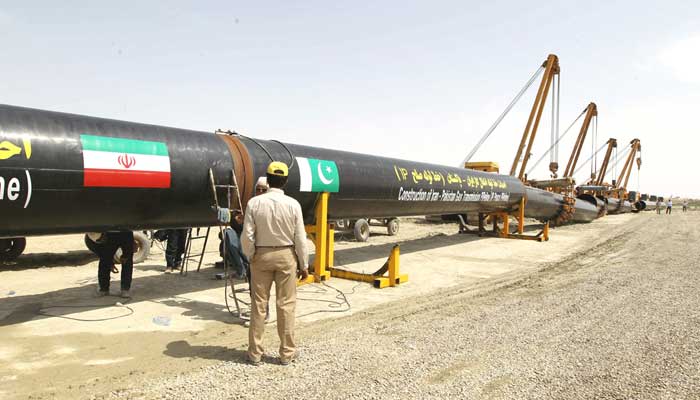- US hasn’t responded to Pakistan yet.
- Iran terms US sanctions “illegal.”
- It’s been almost 13 years since the agreement was signed.
ISLAMABAD: Pakistan has asked the United States if its sanctions on Iran will impact the much-delayed gas pipeline project, a senior official at the Energy Ministry told The News.
The official said the ministry has informally asked the authorities several times, while the State Minister for Petroleum Musadik Malik has also taken up the matter with US functionaries during his recent US visit.
“While coming back home, he also met US officials in Qatar and agitated the issue if the US sanctions imposed on Iran will impact Pakistan if it goes for IP gas line project,” the official added.
Earlier, Special Assistant to the Prime Minister on Foreign Affairs Syed Tariq Fatemi had also spoken to the US authorities about the issue.
“So far, the US has not responded to this effect,” the official said, adding that Pakistan needs a response from the American government to make the final decision on the very important project.
Pakistani authorities are now optimistic about the project, particularly keeping in view of the new era of friendship between Saudi Arabia and Iran backed by Beijing and new geo-strategic alignments. “In the past, there had also been opposition to the project from the Kingdom of Saudi Arabia.”
In the latest development, Tehran asked Islamabad in January 2023 to construct a portion of the Iran-Pakistan (IP) gas pipeline project in its territory till February-March 2024, or be ready to pay a penalty of $18 billion.
During the visit, Iranian authorities claimed that the US sanctions on Iran were illegal and that Pakistan, under the revised agreement, was bound to build the pipeline by February-March 2024. Iran had already completed part of the pipeline in its own territory from the gas field to the Pakistan border.
Prime Minister Shehbaz Sharif had formed a three-member committee headed by Fatemi on how to advance on the issue given the Iranian warning to move French arbitration against Pakistan.
The committee had proposed to engage Iran on the issue and also to launch diplomatic endeavours with US functionaries on various levels to know the impact of sanctions against Iran on Pakistan in case the project gets commissioned.
The IP gas pipeline project was to be completed by December 2014, and gas flow intake was to start from January 2015 but Pakistan could not initiate the pipeline from the Iranian border to Nawabshah.
The Gas Sales Purchase Agreement (GSPA) was signed in 2009 for 25 years. Almost 13 years have passed since the signing of the agreement, and the three-year construction period for the pipeline in Pakistani territory has been wasted. Under the agreement, Pakistan was supposed to lay down in its territory a 781-kilometre pipeline from the Iranian border to Nawabshah.
Under the original agreement, Pakistan is bound to pay $1 million per day to Iran from January 1, 2015, under the penalty clause. And in case Iran moves an arbitration court, Pakistan would have to pay billions of dollars as a penalty. But in Sept 2019, the Inter State Gas Systems of Pakistan (ISGSP) and the National Iranian Gas Company (NIGC) inked a revised agreement for the construction of the gas pipeline.
Under the revised accord, Iran would not approach any international court if there was a delay in the construction of the pipeline, and neither would Pakistan pay any fine to Iran till 2024.
However, after February-March 2024, Iran would be free to approach arbitration against Pakistan. The Islamic Republic reminded Pakistan about the completion deadline of the project, an official said.
The News broke the story in its edition of January 31, 2023, with the headline “Iran dangles the threat of $18 billion penalty over the pipeline project.” On completion, Pakistan would have an intake of 750 million cubic feet of gas from Iran daily.
In the meeting, the official said, it was decided that diplomatic efforts would also be initiated to convince Iran that Pakistan was quite serious about the project and would persuade the authorities not to seek a penalty in case Pakistan fails to meet the deadline of February-March 2024.
They said the country will be trying to get a waiver or relief from the US on the sanctions imposed on Iran.
“Now there are only US sanctions left as the UN curbs are no longer there on Iran for its nuclear programme,” the official said.
“Pakistan is an energy-starved country and it needs relief from the US sanctions so that it can erect the pipeline to ensure sustainable gas availability.”
Iran says the US sanctions are illegal. Experts say sanctions do not bar the construction of the pipeline, but only on gas flows from Iran. India also got a US waiver and has been getting crude oil from Iran since a long time.

 Latest News1 day ago
Latest News1 day ago
 Latest News1 day ago
Latest News1 day ago
 Elections1 day ago
Elections1 day ago
 Latest News1 day ago
Latest News1 day ago
 Latest News1 day ago
Latest News1 day ago
 Business1 day ago
Business1 day ago
 Latest News1 day ago
Latest News1 day ago
 Latest News1 day ago
Latest News1 day ago

























